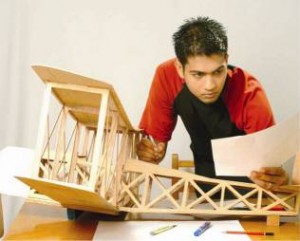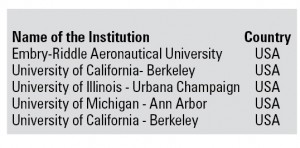Universities in the USA through ANC
View(s):Access Top Engineering
Engineering is one of the most popular study areas for Sri Lankan students with more than 50% of male students and more than 30% of female students selecting their secondary education with the potential ambition of being an engineer in the future. The important question is, how many know exactly what is meant by engineering and how many of these students can really become an engineer? Becoming an engineer is achievable but not an easy task without professional advice. In today’s world there are over 100 majors, or areas of study, in the engineering field. Unfortunately, most students and parents are not aware of these options and think only of a few commonly known fields, missing the best options. That’s why students need to do proper research and understand global trends in engineering.
-There are more than 100 options in engineering, many of them emerging only in recent years as global development and discovery has accelerated. Engineering students must be “future focused”. Some of the more popular and rewarding areas of engineering include the following:
-Aeronautics and aeronautical engineering: This discipline covers subjects ranging from aerospace engineering to thermodynamics, biomechanics and computational control systems.
-Architecture: If you want to be innovative in making buildings and structures, then architecture is the stream for you. It is a combination of physics, mathematics, industrial design, urban planning, civil and mechanical engineering as well.
-Bioengineering: Study of bioengineering will help you improve millions of people with a combination of medicine and technology. You must have a sound knowledge of statistics, computers, medicine, physics and chemistry to be a bioengineer.
-Biotechnology: Biotechnology includes options like zoology, pharmacology and immunology. Prevalence of biotechnology in everyday lives is becoming very common be it in medicines or processed foods that we consume.
-Chemical Engineering: Chemical engineers work towards the development of medicinal products and therapies and various chemical products used in homes and factories.
-Civil Engineering: Civil engineers toil hard in the open to develop buildings and houses bridges and other structures where we work and live. They also help them maintain those buildings. Civil engineers also take note of societal issues like energy conservation and safety of structures as well.
-Computer Engineering: This discipline contains elements of both electrical engineering and computer science. Computer engineers are involved with different aspects of computing. It is one of the most sought after courses in the field of engineering.
-Environmental Engineering: For environmental engineering you need to have a background in chemistry, hydrology and environmental systems. A lot of independent research is necessary in this field.
-Electrical engineering: Electrical engineering deals with subjects like electricity, electronics and electromagnetism. It now covers areas like telecommunications, control systems, and signal processing.
-Manufacturing Engineering: Everything that is manufactured is part of manufacturing engineering. Whether it is automobile parts, household products, toys or textile, manufacturing engineers have a big role to play.
-Mechanical Engineering: If you want to build engines and deal with power plants, heating and cooling systems, aircraft and industrial equipment, then mechanical engineering is the right discipline for you. It uses key concepts in mechanics, thermodynamics, kinematics and energy.
Metallurgical Engineering: Metallurgical engineers deal with the behavior of inter-metallic compounds and their alloys. Metallurgy is concerned with the production of metallic compounds which are used for consumer and engineering products.
Materials Science and Engineering: This branch of engineering deals with different materials like ceramics, electronic materials, metals, and biomaterials. They study the reaction of different materials under conditions such as pressure and temperature.
-Nuclear Engineering: Nuclear engineering includes the study of nuclear physics along with nuclear safety, nuclear fusion, nuclear fuels technology and effects of radioactivity in the environment.
-Optical Sciences: Optical science is a relatively new field. It revolves round the study of transmission, utilization and detection of light. An optical engineer can see his growth in industries like manufacturing, communications technology, life sciences and defense.
-Petroleum Engineering: The main job for petroleum engineers is to extract oil from impossible places and situations. It covers an array of topics including economics, geology, geochemistry, geomechanics, geophysics, oil drilling, and oil and gas production among others.
-Telecommunication Engineering: This is a very rapidly growing area in the field of engineering. Telecommunication engineers deal in the areas of network security, internet, computer network security, and computer network systems.
More than one hundred thousand students study engineering in universities all around the world, with America being the No 1 destination for international students. Ranked the World’s top economy and recently ranked No 1 in both manufacturing output and industrial output as well as innovation, America is an ideal study environment for engineering students and, with the OPT (Optional Practical Training) Program graduates can gain career work experience as well as their education..
With 4 of the World’s Top 5 universities and 75% of the Top 20, America is a superior destination for quality higher education and the resulting opportunities. World-ranked Top Engineering universities in America include the following:
Engineering is a continuously developing area. One who starts a career with engineering has a long way to go and many aspects to develop. Engineering plays a critical role in nearly all aspects of our lives. Engineers help development in every aspect of our lives as well as our countries. Engineering is the way dreams become reality.
ANC allows students to experience the real American University environment after O/Levels or A/Levels with PhD qualified faculty, state of the art facilities, and unequaled education resources right here in Sri Lanka. Start your engineering future with the No. 1 American University Transfer Program in Sri Lanka and save up to 70% on your US degree by completing 2 or 3 years in Sri Lanka and the final year in the US. Contact Hareeni in Admissions on 077 38 999 38 and get the professional advice you need to become a truly successful engineer.

Follow @timesonlinelk



















